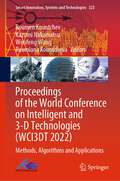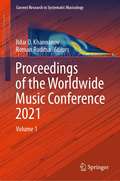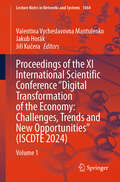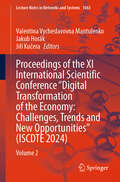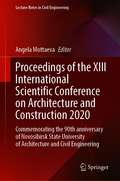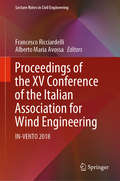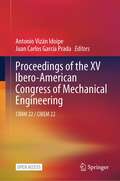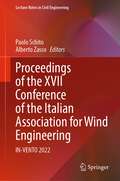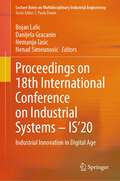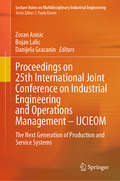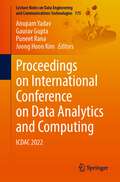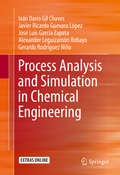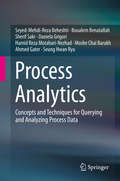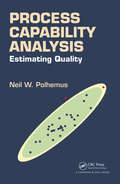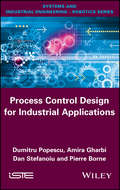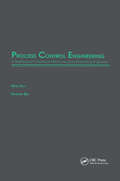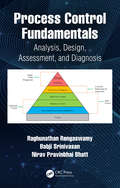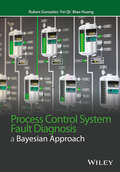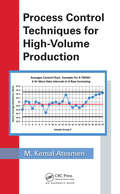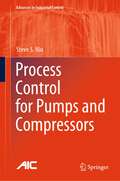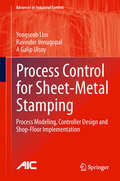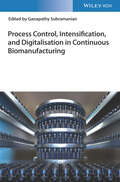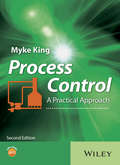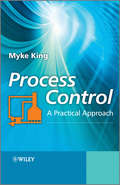- Table View
- List View
Proceedings of the World Conference on Intelligent and 3-D Technologies: Methods, Algorithms and Applications (Smart Innovation, Systems and Technologies #323)
by Kazumi Nakamatsu Roumen Kountchev Wenfeng Wang Roumiana KountchevaThis book features a collection of high-quality, peer-reviewed research papers presented at first ‘World Conference on Intelligent and 3-D Technologies’ (WCI3DT 2022), held in China during May 24–26, 2022. The book provides an opportunity for the researchers and academia as well as practitioners from industry to publish their ideas and recent research development work on all aspects of 3D imaging technologies and artificial intelligence, their applications, and other related areas. The book presents ideas and the works of scientists, engineers, educators, and students from all over the world from institutions and industries.
Proceedings of the Worldwide Music Conference 2021: Volume 1 (Current Research in Systematic Musicology #8)
by Ildar D. Khannanov Roman RuditsaThis book presents sixteen chapters in Volume 1. This Volume I of the Proceedings of the Worldwide Music Conference 2021 offers a smorgasbord of scientific approaches to music. The congress is one of a kind; it is dedicated not to a specific field but to the interdisciplinary developments and the interaction with the representatives from actual scientific disciplines. The languages of mathematics, computer science, semiotics, palaeography, and medicine are in the mix; geography of the studies is also impressive—Greece, Mexico, China, Russia, India, Poland, and USA, to name just a few. The purpose of such juxtaposition is to see how the terminology, categorical apparatus, and interpretations of music vary from science to science and how this can enrich the terminology of music theory. They cover a wide range of topics that the editors divided into four subfields: music in interdisciplinary contexts, music and current technology, musical instruments and voice, and music pedagogy and medicine. The opening section of the Proceedings is thus dedicated to the idea of interdisciplinarity, relationship of creator of theory of harmony Rameau to sciences of his time, the idea of number in music, co-creation, and the category of musical network. Three more chapters here deal with Russian palaeography, Indian musical genre, and the idea of musical semiotics. It is a kind of opening statement from music theorists. Part two, music and current technology, united three chapters, on “zero gravity” concept in modern music, discussion of scales as mathematical networks, and the innovation in digital music making, transforming it from stationary to mobile applications. The third part, musical instruments and voice, is of special interest because it is in the study of the instruments, the design, acoustic characteristics, and tuning, and sciences have cooperated with music theory for centuries. In addition to instruments, one chapter here is dedicated to voice. The last part, musical pedagogy and medicine, takes the reader even further into the interdisciplinary domain. The Proceedings is written in standard English language, prepared for the pleasure of reading of wide circles of professionals in different fields. The purpose of the editors is to bring this rather diverse set of texts into the context of a fruitful dialogue.
Proceedings of the XI International Scientific Conference "Digital Transformation of the Economy: Volume 1 (Lecture Notes in Networks and Systems #1064)
by Jakub Horák Valentina Vycheslavovna Mantulenko Jiří KučeraThis book includes selected reports of the XI International Scientific Conference “Digital Transformation of the Economy: Challenges, Trends and New Opportunities” (ISCDTE 2024), Samara, Russia. The proceedings volumes present the latest research on the digital transformation of the economy, its challenges, trends and new opportunities. The conference mainly focused on issues of the digital transformation, such as the theoretical background for the development of socio-economic systems in the digital age and specific practical issues related to actual business practices. Consisting of 8 chapters corresponding to the thematic areas of the conference, and written by scientists and practitioners from different regions, the book offers answers to the most pressing questions for contemporary business, research, engineering and education community from the perspective of the new reality.
Proceedings of the XI International Scientific Conference "Digital Transformation of the Economy: Volume 2 (Lecture Notes in Networks and Systems #1063)
by Jakub Horák Valentina Vycheslavovna Mantulenko Jiří KučeraThis book includes selected reports of the XI International Scientific Conference “Digital Transformation of the Economy: Challenges, Trends and New Opportunities” (ISCDTE 2024), Samara, Russia. The proceedings volumes present the latest research on the digital transformation of the economy, its challenges, trends and new opportunities. The conference mainly focused on issues of the digital transformation, such as the theoretical background for the development of socio-economic systems in the digital age and specific practical issues related to actual business practices. Consisting of 8 chapters corresponding to the thematic areas of the conference, and written by scientists and practitioners from different regions, the book offers answers to the most pressing questions for contemporary business, research, engineering and education community from the perspective of the new reality.
Proceedings of the XIII International Scientific Conference on Architecture and Construction 2020: Commemorating the 90th anniversary of Novosibirsk State University of Architecture and Civil Engineering (Lecture Notes in Civil Engineering #130)
by Angela MottaevaThe book contains the latest studies on digitalization of transport and logistics, improving vehicle fuel efficiency, information technology and digital security, land management and cadastres, building structures, structural analysis, and energy conservation in construction. This book consists of papers presented during the XIII International Scientific Conference on Architecture and Construction 2020, which is dedicated to the 90th anniversary of Novosibirsk State University of Architecture and Civil Engineering, held on September 22–24, 2020. The book caters to researchers, scientists and industrial practitioners in the field of transportation engineering, logistics, intelligent transport systems, sustainable construction for housing and industrial buildings.
Proceedings of the XV Conference of the Italian Association for Wind Engineering: IN-VENTO 2018 (Lecture Notes in Civil Engineering #27)
by Francesco Ricciardelli Alberto Maria AvossaThis volume gathers the latest advances, innovations, and applications in the field of wind engineering, as presented by leading international researchers and engineers at the XV Conference of the Italian Association for Wind Engineering (IN-VENTO 2018), held in Naples, Italy on September 9-12, 2018. It covers highly diverse topics, including aeroelasticity, bluff-body aerodynamics, boundary layer wind tunnel testing, computational wind engineering, structural dynamics and reliability, wind-structure interaction, flow-induced vibrations, wind modeling and forecast, wind disaster mitigation, and wind climate assessment. The contributions, which were selected by means of a rigorous international peer-review process, highlight numerous exciting ideas that will spur novel research directions and foster multidisciplinary collaboration among different specialists.
Proceedings of the XV Ibero-American Congress of Mechanical Engineering: CIBIM 22 / CIBEM 22
by Juan Carlos García Prada Antonio Vizán IdoipeThis open access book shows some of the highlights presented at the XV Ibero-American Congress of Mechanical Engineering. The papers explore the forefront of Mechanical Engineering, containing research into fluid mechanics, energy systems, tribology, materials science, robotics, mechatronics, biomechanics, instrumentation, thermodynamics, and mechanical sustainability.
Proceedings of the XVII Conference of the Italian Association for Wind Engineering: IN-VENTO 2022 (Lecture Notes in Civil Engineering #461)
by Paolo Schito Alberto ZassoThis volume gathers the latest advances, innovations, and applications in the field of wind engineering, as presented by leading international researchers and engineers at the XVII Conference of the Italian Association for Wind Engineering (IN-VENTO), held in Milan, Italy on September 4–7, 2022. It covers highly diverse topics, including aeroelasticity, bluff-body aerodynamics, boundary layer wind tunnel testing, computational wind engineering, structural dynamics and reliability, wind-structure interaction, flow-induced vibrations, wind modeling and forecast, wind disaster mitigation, and wind climate assessment. The contributions, which were selected by means of a rigorous international peer-review process, highlight numerous exciting ideas that will spur novel research directions and foster multidisciplinary collaboration among different specialists.
Proceedings on 18th International Conference on Industrial Systems – IS’20: Industrial Innovation in Digital Age (Lecture Notes on Multidisciplinary Industrial Engineering)
by Bojan Lalic Danijela Gracanin Nemanja Tasic Nenad SimeunovićThis book proposes theoretically developed and practically tested solutions for manufacturing and business improvements achieved in the period between two conferences. It enables presentation of new knowledge and exchange of practical experience in industrial systems engineering and management. It brings together prominent researchers and practitioners from faculties, scientific institutes, and different enterprises or other organizations .This is the 18th edition of the conference. The Department of Industrial Engineering and Management at the Faculty of Technical Sciences in Novi Sad organizes a scientific conference on industrial systems engineering and management field of science and practice, once in three years.
Proceedings on 25th International Joint Conference on Industrial Engineering and Operations Management – IJCIEOM: The Next Generation of Production and Service Systems (Lecture Notes on Multidisciplinary Industrial Engineering)
by Zoran Anisic Bojan Lalic Danijela GracaninThis book presents the conference proceedings of the 25th edition of the International Joint Conference on Industrial Engineering and Operations Management. The conference is organized by 6 institutions (from different countries and continents) that gather a large number of members in the field of operational management, industrial engineering and engineering management. This edition of the conference had the title: THE NEXT GENERATION OF PRODUCTION AND SERVICE SYSTEMS in order to emphasis unpredictable and very changeable future. This conference is aimed to enhance connection between academia and industry and to gather researchers and practitioners specializing in operation management, industrial engineering, engineering management and other related disciplines from around the world.
Proceedings on International Conference on Data Analytics and Computing: ICDAC 2022 (Lecture Notes on Data Engineering and Communications Technologies #175)
by Gaurav Gupta Anupam Yadav Joong Hoon Kim Puneet RanaThis book features selected papers presented at International Conference on Data Analytics and Computing (ICDAC 2022), organized by Department of Mathematics, College of Science and Technology, Wenzhou-Kean University, Wenzhou, China, held during May 28–29, 2022. This book includes state-of-the-art current trends in data science, data analytics optimization, soft computing and related areas. Its primary readers are postgraduate students, researchers and academic professionals.
Process Analysis and Simulation in Chemical Engineering
by Iván Darío Gil Chaves Javier Ricardo Guevara López José Luis García Zapata Alexander Leguizamón Robayo Gerardo Rodríguez NiñoThis book offers a comprehensive coverage of process simulation and flowsheeting, useful for undergraduate students of Chemical Engineering and Process Engineering as theoretical and practical support in Process Design, Process Simulation, Process Engineering, Plant Design, and Process Control courses. The main concepts related to process simulation and application tools are presented and discussed in the framework of typical problems found in engineering design. The topics presented in the chapters are organized in an inductive way, starting from the more simplistic simulations up to some complex problems.
Process Analytics
by Seyed-Mehdi-Reza Beheshti Boualem Benatallah Sherif Sakr Daniela Grigori Hamid Reza Motahari-Nezhad Moshe Chai Barukh Ahmed Gater Seung Hwan RyuThis book starts with an introduction to process modeling and process paradigms, then explains how to query and analyze process models, and how to analyze the process execution data. In this way, readers receive a comprehensive overview of what is needed to identify, understand and improve business processes. The book chiefly focuses on concepts, techniques and methods. It covers a large body of knowledge on process analytics - including process data querying, analysis, matching and correlating process data and models - to help practitioners and researchers understand the underlying concepts, problems, methods, tools and techniques involved in modern process analytics. Following an introduction to basic business process and process analytics concepts, it describes the state of the art in this area before examining different analytics techniques in detail. In this regard, the book covers analytics over different levels of process abstractions, from process execution data and methods for linking and correlating process execution data, to inferring process models, querying process execution data and process models, and scalable process data analytics methods. In addition, it provides a review of commercial process analytics tools and their practical applications. The book is intended for a broad readership interested in business process management and process analytics. It provides researchers with an introduction to these fields by comprehensively classifying the current state of research, by describing in-depth techniques and methods, and by highlighting future research directions. Lecturers will find a wealth of material to choose from for a variety of courses, ranging from undergraduate courses in business process management to graduate courses in business process analytics. Lastly, it offers professionals a reference guide to the state of the art in commercial tools and techniques, complemented by many real-world use case scenarios.
Process Capability Analysis: Estimating Quality
by Neil W. PolhemusProcess Capability Analysis: Estimating Quality presents a systematic exploration of process capability analysis and how it may be used to estimate quality. The book is designed for practitioners who are tasked with insuring a high level of quality for the products and services offered by their organizations. Along with describing the necessary statistical theory, the book illustrates the practical application of the techniques to data that do not always satisfy the standard assumptions. <P><P> The first two chapters deal with attribute data, where the estimation of quality is restricted to counts of nonconformities. Both classical and Bayesian methods are discussed. The rest of the book deals with variable data, including extensive discussions of both capability indices and statistical tolerance limits. Considerable emphasis is placed on methods for handling non-normal data. Also included are discussions of topics often omitted in discussions of process capability, including multivariate capability indices, multivariate tolerance limits, and capability control charts. A separate chapter deals with the problem of determining adequate sample sizes for estimating process capability. <P><P> Features: <li> Comprehensive treatment of the subject with consistent theme of estimating percent of nonconforming product or service. <li> Includes Bayesian methods. <li> Extension of univariate techniques to multivariate data. <li> Demonstration of all techniques using Statgraphics data analysis software. <P><P> Neil Polhemus is Chief Technology Officer at Statgraphics Technology and the original developer of the Statgraphics program for statistical analysis and data visualization. Dr. Polhemus spent 6 years on the faculty of the School of Engineering and Applied Science at Princeton University before moving full-time to software development and consulting. He has taught courses dealing with statistical process control, design of experiments and data analysis for more than 100 companies and government agencies.
Process Control Design for Industrial Applications
by Pierre Borne Dumitru Popescu Dan Stefanoiu Amira GharbiThis book presents the most important methods used for the design of digital controls implemented in industrial applications. The best modelling and identification techniques for dynamical systems are presented as well as the algorithms for the implementation of the modern solutions of process control. The proposed described methods are illustrated by various case studies for the main industrial sectors There exist a number of books related each one to a single type of control, yet usually without comparisons for various industrial sectors. Some other books present modelling and identification methods or signal processing. This book presents the methods to solve all the problems linked to the design of a process control without the need to find additional information.
Process Control Engineering
by A.Ramachandro. RaoProcess Control Engineering is a textbook for chemical, mechanical and electrical engineering students, providing the theoretic fundamentals of control systems, and highlighting modern control theory and practical aspects of industrial processes. The introductory nature of the text should appeal to undergraduate students, while later chapters on linear systems, optimal control, adaptive control and intelligent control are directed toward advanced students and practising engineers. The textbook has been extensively tested in both undergraduate and graduate courses at the University of Alberta.
Process Control Fundamentals: Analysis, Design, Assessment, and Diagnosis
by Raghunathan Rengaswamy Babji Srinivasan Nirav Pravinbhai BhattThe field of process control has evolved gradually over the years, with emphasis on key aspects including designing and tuning of controllers. This textbook covers fundamental concepts of basic and multivariable process control, and important monitoring and diagnosis techniques. It discusses topics including state-space models, Laplace transform to convert state-space models to transfer function models, linearity and linearization, inversion formulae, conversion of output to time domain, stability analysis through partial fraction expansion, and stability analysis using Routh table and Nyquits plots. The text also covers basics of relative gain array, multivariable controller design and model predictive control. The text comprehensively covers minimum variable controller (MVC) and minimum variance benchmark with the help of solved examples for better understanding. Fundamentals of diagnosis of control loop problems are also explained and explanations are bolstered through solved examples. Pedagogical features including solved problems and unsolved exercises are interspersed throughout the text for better understanding. The textbook is primarily written for senior undergraduate and graduate students in the field of chemical engineering and biochemical engineering for a course on process control. The textbook will be accompanied by teaching resource such a collection of slides for the course material and a includsolution manual for the instructors.
Process Control System Fault Diagnosis: A Bayesian Approach
by Biao Huang Ruben Gonzalez Fei QiProcess Control System Fault Diagnosis: A Bayesian Approach Ruben T. Gonzalez, University of Alberta, Canada Fei Qi, Suncor Energy Inc., Canada Biao Huang, University of Alberta, Canada Data-driven Inferential Solutions for Control System Fault Diagnosis A typical modern process system consists of hundreds or even thousands of control loops, which are overwhelming for plant personnel to monitor. The main objectives of this book are to establish a new framework for control system fault diagnosis, to synthesize observations of different monitors with a prior knowledge, and to pinpoint possible abnormal sources on the basis of Bayesian theory. Process Control System Fault Diagnosis: A Bayesian Approach consolidates results developed by the authors, along with the fundamentals, and presents them in a systematic way. The book provides a comprehensive coverage of various Bayesian methods for control system fault diagnosis, along with a detailed tutorial. The book is useful for graduate students and researchers as a monograph and as a reference for state-of-the-art techniques in control system performance monitoring and fault diagnosis. Since several self-contained practical examples are included in the book, it also provides a place for practicing engineers to look for solutions to their daily monitoring and diagnosis problems. Key features: * A comprehensive coverage of Bayesian Inference for control system fault diagnosis. * Theory and applications are self-contained. * Provides detailed algorithms and sample Matlab codes. * Theory is illustrated through benchmark simulation examples, pilot-scale experiments and industrial application. Process Control System Fault Diagnosis: A Bayesian Approach is a comprehensive guide for graduate students, practicing engineers, and researchers who are interests in applying theory to practice.
Process Control Techniques for High-Volume Production
by M. Kemal AtesmenThis book details most common statistical process control tools with many examples for high-volume production. It aims to make elements of high-volume production process control simple and easy to understand. It lets you thoroughly understand process controls instead of blindly trusting software tools that operate as black boxes. If you are dealing with high-volume production as an operator, line supervisor, inspector, process engineer, quality engineer, manufacturing manager, plant manager, or president of the company, you have to understand the statistical process control basics explained in this book in order to be successful.
Process Control for Pumps and Compressors (Advances in Industrial Control)
by Steve S. NiuThis book provides a summary of the essential knowledge and working processes involved with control of rotating equipment including:machine characteristics;overall control strategies;detailed design; andbest practices.Emphasis is placed on the role of pumps and compressors as part of the overall process flow rather than treating them in isolation as this tends to optimize energy efficiency.Readers are made aware of the critical roles of rotating equipment and are given a good understanding of their dynamic behaviors, including surge/choke. The author imparts the practical know-how and skills involved in the design and implementation of capacity and anti-surge control and safe-guarding logic. Furthermore, the book discusses real-time monitoring of solutions based on operational requirements, dynamic models for control of supply and demand, cause-and-effect relationships, the use of online and offline data, and collaboration with other engineering disciplines. The text facilitates support for the day-to-day operation of in-house open-platform compressor control applications, encouraging the growth of analytic skills in troubleshooting and fixing common problems; it also inculcates a basic understanding of the principles of third-party proprietary technologies and supports decision-making between in-house and third-party solutions.Process engineers working in the oil-and-gas, refining, petrochemical, and chemical industries who bear responsibility for designing control solutions involving pumps and compressors will find this book an invaluable source of practical advice. This book also helps engineers working on design and maintenance of rotating equipment to understand the perspectives and requirements of process control.
Process Control for Sheet-Metal Stamping
by Yongseob Lim Ravinder Venugopal A Galip UlsoyProcess Control for Sheet-Metal Stamping presents a comprehensive and structured approach to the design and implementation of controllers for the sheet metal stamping process. The use of process control for sheet-metal stamping greatly reduces defects in deep-drawn parts and can also yield large material savings from reduced scrap. Sheet-metal forming is a complex process and most often characterized by partial differential equations that are numerically solved using finite-element techniques. In this book, twenty years of academic research are reviewed and the resulting technology transitioned to the industrial environment. The sheet-metal stamping process is modeled in a manner suitable for multiple-input multiple-output control system design, with commercially available sensors and actuators. These models are then used to design adaptive controllers and real-time controller implementation is discussed. Finally, experimental results from actual shop floor deployment are presented along with ideas for further improvement of the technology. Process Control for Sheet-Metal Stamping allows the reader to design and implement process controllers in a typical manufacturing environment by retrofitting standard hydraulic or mechanical stamping presses and as such will be of interest to practising engineers working in metal-working, automotive and aeronautical industries. Academic researchers studying improvements in process control and how these affect the industries in which they are applied will also find the text of value.
Process Control, Intensification, and Digitalisation in Continuous Biomanufacturing
by Ganapathy SubramanianProcess Control, Intensification, and Digitalisation in Continuous Biomanufacturing Explore new trends in continuous biomanufacturing with contributions from leading practitioners in the field With the increasingly widespread acceptance and investment in the ??technology, the last decade has demonstrated the utility of continuous ??processing in the pharmaceutical industry. In Process Control, Intensification, and Digitalisation in Continuous Biomanufacturing, distinguished biotechnologist Dr. Ganapathy Subramanian delivers a comprehensive exploration of the potential of the continuous processing of biological products and discussions of future directions in advancing continuous processing to meet new challenges and demands in the manufacture of therapeutic products. A stand-alone follow-up to the editor’s Continuous Biomanufacturing: Innovative Technologies and Methods published in 2017, this new edited volume focuses on critical aspects of process intensification, process control, and the digital transformation of biopharmaceutical processes. In addition to topics like the use of multivariant data analysis, regulatory concerns, and automation processes, the book also includes: Thorough introductions to capacitance sensors to control feeding strategies and the continuous production of viral vaccines Comprehensive explorations of strategies for the continuous upstream processing of induced microbial systems Practical discussions of preparative hydrophobic interaction chromatography and the design of modern protein-A-resins for continuous biomanufacturing In-depth examinations of bioprocess intensification approaches and the benefits of single use for process intensification Perfect for biotechnologists, bioengineers, pharmaceutical engineers, and process engineers, Process Control, Intensification, and Digitalisation in Continuous Biomanufacturing is also an indispensable resource for chemical engineers seeking a one-stop reference on continuous biomanufacturing.
Process Control: A Practical Approach
by Myke KingSo why another book on process control? Process Control: A Practical Approach is a ground-breaking guide that provides everything needed to design and maintain process control applications. <P><P>The book follows the hierarchy from basic control, through advanced regulatory control, up to and including multivariable control. It addresses many process-specific applications including those on fired heaters, compressors and distillation columns. <P><P>Written with the practicing control engineer in mind, the book: Brings together proven design methods, many of which have never been published before Focuses on techniques that have an immediate practical application Minimizes the use of daunting mathematics - but for the more demanding reader, complex mathematical derivations are included at the end of each chapter Covers the use of all the algorithms, common to most distributed control systems This book raises the standard of what might be expected of even basic controls. In addition to the design methods it describes any shortcuts that can be taken and how to avoid common pitfalls. Proper application will result in significant improvements to process performance. Myke King's practical approach addresses the needs of the process industry, and will improve the working practices of many control engineers. "This book would be of value to process control engineers in any country." - Mr Andrew Ogden-Swift, Chairmain, Process Management and Control Subject Group, Institution of Chemical Engineers, UK "This book should take the process-control world by storm." - Edward Dilley, Lecturer in Process Control, ESD Simulation Training
Process Control: A Practical Approach
by Myke KingThis expanded new edition is specifically designed to meet the needs of the process industry, and closes the gap between theory and practice. Back-to-basics approach, with a focus on techniques that have an immediate practical application, and heavy maths relegated to the end of the book Written by an experienced practitioner, highly regarded by major corporations, with 25 years of teaching industry courses Supports the increasing expectations for Universities to teach more practical process control (supported by IChemE)
Process Control: A Practical Approach
by Myke KingSo why another book on process control? Process Control: A Practical Approach is a ground-breaking guide that provides everything needed to design and maintain process control applications. The book follows the hierarchy from basic control, through advanced regulatory control, up to and including multivariable control. It addresses many process-specific applications including those on fired heaters, compressors and distillation columns. Written with the practicing control engineer in mind, the book: Brings together proven design methods, many of which have never been published before Focuses on techniques that have an immediate practical application Minimizes the use of daunting mathematics – but for the more demanding reader, complex mathematical derivations are included at the end of each chapter Covers the use of all the algorithms, common to most distributed control systems This book raises the standard of what might be expected of even basic controls. In addition to the design methods it describes any shortcuts that can be taken and how to avoid common pitfalls. Proper application will result in significant improvements to process performance. Myke King’s practical approach addresses the needs of the process industry, and will improve the working practices of many control engineers. “This book would be of value to process control engineers in any country.” – Mr Andrew Ogden-Swift, Chairmain, Process Management and Control Subject Group, Institution of Chemical Engineers, UK “This book should take the process-control world by storm.” – Edward Dilley, Lecturer in Process Control, ESD Simulation Training
